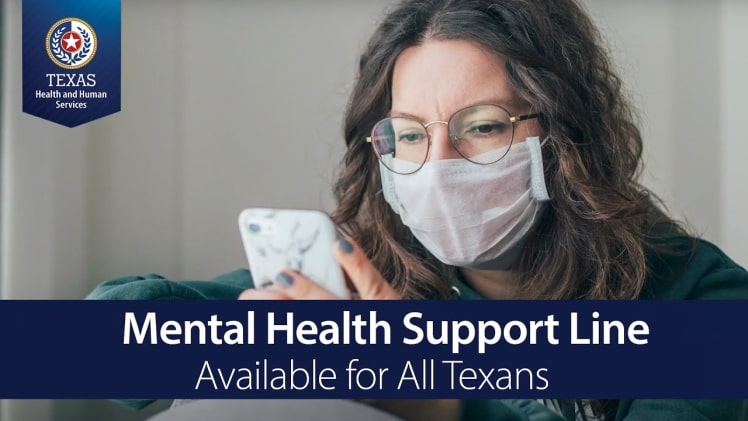Within 30 days of its launch, Texas’s new mental health support line received over two thousand calls from residents. These were from Texans going through isolation, fear, anxiety, depression, and sickness, all dealing with lost jobs, a worrying economy, and family issues stemming from the growing virus. Although the calls ranged from people across different age groups, everyone suffered from common issues.
Not being able to meet loved ones.
The Texas Mental Health Support Line has received numerous calls expressing the anger, frustration, and vulnerability of those not being able to be near their loved ones. In one such example, the helpline received a call from an 87-year-old woman complaining about having to stay away from her family at an assisted living facility, because the facility had restricted the entry of anyone who could pose a threat to its residents’ health. The helpline assisted the lady with technological inputs that could help her see and hear her loved ones.
Lack of attention among children
Children have been among the most vulnerable during the pandemic. They were separated from their schools and friends and denied precious childhood moments. The change from offline to online took a toll on many. Texas admitted the highest number of young suicide cases during the pandemic and recorded an increase in the number of substance abuse cases. While the adults in the family were busy working, and the teachers were trying to learn how to teach online, these young minds were suffering from fear and uncertainty.
The Texas Mental Health Support Line received a call from a mom in northeast Texas who was angry over her son’s careless attitude towards his homework. The attendants at the call center addressed the mother’s worry about the child’s future. They asked her to reflect on the home environment and, in doing so, helped her understand that her son missed his school teacher and felt distracted at home, making him forget his homework.
A mental health professional from Houston’s Harris Centre for Medical Health assisted her with her case and asked her to keep in touch with his teacher. The professional suggested she turn off the T.V., fix a family schedule and designate a study area for the child. While the mother was bothered at the beginning of the call, simple inputs resolved her problem.
Worklife Crisis
A number of companies went out of business during the pandemic. Others survived, but not without layoffs and pay cuts. The overnight switch to remote working was complicated and chaotic for the entire corporate space. From the number of employee calls received by the Texas Mental Health Support Line, it was clear that a work-life crisis was one of the leading causes of mental issues among Texans.
One call received was from a laid-off employee who felt suicidal after becoming unemployed. She was feeling symptoms of depression and helplessness. A professional mental health consultant engaged in a session with her and explained the implications of ending one’s life, its impact, and other options available to help her handle her work-life crisis. It took a small session to understand her issue, connect her with a professional, and ensure that she was safe and set to get well through adequate medical intervention.
Jennifer Battle, the director of access at the Harris Center, said that the helpline staff was trained to assist the callers with coping mechanisms, from listening patiently to the speakers and guiding them through panic attacks, to equipping them with strategies for future problems. A spokesperson for the Health and Human Services Commission of Texas, Elliot Sprehe, said that the state residents calling the hotline could talk with any of 39 mental health professionals who provide over-the-call support and referrals to other services and information. Over 58% of the callers had their issues resolved by the support helpline and didn’t need any external intervention. The others were connected with designated health services and professionals.
Collaborating with the Harris Center, the mental health support line has formed virtual support groups, organizing Zoom conferences for healthcare workers and patients seeking emotional support. Whether the caller has insurance or not, they’re immediately connected with local mental health authorities or hotlines. However, the state’s efforts are not limited to establishing a Mental Health Support Line. State authorities want to create a robust mental healthcare infrastructure. Along with government bodies, the private sector is also stepping forward to invest in the mental healthcare sector’s research, training, and service availability.
New practices like Geode Health are opening for mental health issues that require care beyond a phone line, with a new Geode Health Allen, Texas location and plans to open 30+ other clinics in the state within the next 18 months. With readily available mental healthcare, patients can recover and restore their mental health with professional guidance and medical assistance.
The Texas Mental Health Support Line was a great step toward creating a comfortable and sensitive environment for individuals to overcome the mental health crisis. Efforts like this will expand to more aspects of the mental healthcare infrastructure and yield positive results.

